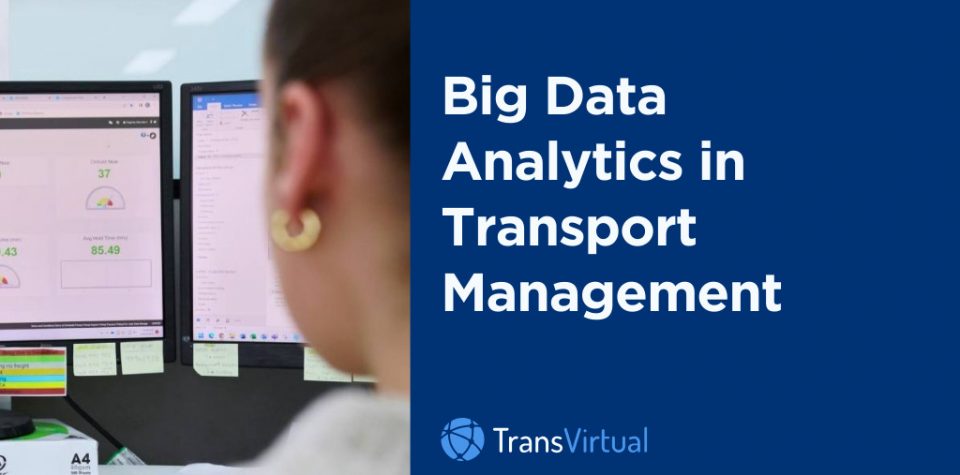Table of Contents
The transportation industry stretches across every continent and is comprised of thousands of trucks, ships, planes, and people. Our global supply chain is an unimaginably complex system – yet with that complexity comes an inherent vulnerability: it’s prone to costly delays, inefficiencies, and unexpected disruptions.
But there’s a powerful solution you’ll find that emerges from within this complexity: big data.
Big data has proven time and again to be the key to untangling the complexities of the global supply chain. Its power to transform logistics and transportation operations, its ability to empower businesses with route optimisation, reduced fuel consumption, predicting equipment failures, and accurately forecasting demand, cannot be understated.
With big data, your business can benefit from streamlined processes, substantial cost savings, and an enhanced ability to make strategic decisions with unprecedented confidence.
If you’re unfamiliar with big data or want to gain insight into how it bolsters the work of countless entities within the global transportation industry, you’re in luck. Today, let’s explore the role big data plays in logistics and transportation management.
What is Big Data?
While “big data” might sound like an impenetrable concept if you aren’t a mathematician, it’s actually pretty straightforward. The term refers to the ever-growing collections of information that old school databases can’t easily handle. You can break it down in three ways:
- Volume: The sheer amount of big data and the size of each data set is truly immense, measured in terabytes or even petabytes. Compare than to a single larger-than-average spreadsheet – only around a megabyte.
- Velocity: Big data comes in at lightning speed and often in real-time, thanks to modern transportation and logistics software tools that function as data aggregators.
- Variety: Within big data you’ll find a mixture of structured data like numbers and dates combined with more unstructured data like sensor readings and digital content from the Internet and social media.
Data Sources in Logistics
Out of all the industries on the planet, there’s a strong argument to be made that the logistics and transportation industry is one of (if not the) biggest producers and users of big data. It’s a veritable gold mine of this granular detail, with common sources like these:
- GPS Tracking: Companies in the trucking industry receive a constant stream of real-time location data from their trucks, ships, and aircraft to help enhance route optimisation and delivery monitoring.
- Sensors: A multitude of devices attached to vehicles and equipment monitor things like temperature, vibrations, fuel levels, and much more to enable predictive maintenance.
- Transaction Logs: Supply and demand patterns can be monitored through data collected from sales records, purchase orders, and inventory data.
- External Data: Operations receive information on traffic patterns, weather conditions, and more niche data like public and social media sentiment (often from reviews), all of which add valuable context. Efficient data replication strategies are essential for maintaining the integrity of external data sources
Transforming Logistics with Big Data
Big data isn’t solely focused on collecting information – it’s more concerned with harnessing that data to implement it in real-world improvements across the logistics world. Big data analytics has been making huge waves as it helps to revolutionise key areas, including:
- Route Optimisation: Analysis of real-time traffic conditions, current and prior weather patterns, as well as other historical data enables algorithms to determine the most efficient routes. This means businesses can save on fuel, reduce their delivery times, and improve customer satisfaction across the board.
- Predictive Maintenance: With the help of sensors embedded in their trucks and trailers, businesses receive a regular stream of data on wear and tear, potential faults, and other performance metrics. This means they can perform more proactive maintenance to minimise unexpected breakdowns which could otherwise lead to costly delays. Plus, they can maximise the lifespan of their most valuable assets.
- Demand Forecasting: Big data allows businesses to sift through patterns in historical sales data. They can then identify market trends and seasonal fluctuations, or even get a better sense of public opinions on particular brands and types of goods. This allows businesses to accurately predict demand, reduce stock-outs and overstocking, then ensure every product makes it to the right place at the right time.
Realising Cost Savings & Efficiency
This will make the most sense of all to business owners and managers in the trucking business: big data’s main transformative power is how well it translates into bottom-line savings and increased operational efficiency.
The many solutions enabled by big data allow for more optimised routes, reduced fuel consumption, and streamlined maintenance plans which have a compounding effect, leading to serious reductions in overall transportation costs. It also means a more efficient warehouse operation along every step – as businesses analyse their sales patterns, product movement, order histories, and more, they can utilise algorithms to pinpoint ideal inventory placement. This optimises the use of space and streamlines picking routes to reduce unnecessary movement, boost worker productivity, and minimise costly errors.
Also, big data allows businesses to mitigate or eliminate certain risks. You’ll be able to reroute shipments, adjust schedules, and allocate resources according to the information you gather on weather events, traffic congestion, and other potential disruptions. All of this working in tandem leads to fewer delays and unexpected expenses, improving the resilience of your supply chain and boosting your productivity.
Enhancing Your Strategic Decision-Making
Big data helps with streamlining daily operations, but the analytic information you’ll receive provides a powerful perspective to make strategic choices to drive your long-term success.
By analysing historical demand patterns and market trends, you’ll be able to scale up capacity with additional vehicles in your fleet when needed. You can increase your storage or labour in advance to avoid costly rush adjustments and lost sales.
With insights into your company’s vehicle usage patterns, fuel efficiency, and maintenance needs, you can identify underutilised assets. You’ll also find potential areas for reducing costs or improving your overall fleet ROI.
Plus, big data plays a huge role in optimising the entirety of your logistics network. Your business can make data-informed decisions about warehouse locations, the where’s and whys of newly established distribution centres, and which routes are the most efficient for serving your customers’ needs.
Ultimately, this elevates your decision-making from being a reactive process to more of a pro-active and data-driven approach. That way, you’ll always stay ahead of the curve.
How Big Data Impacts the Future of Logistics
Because of the impact big data has already made on the logistics world, we can reasonably expect it to continue changing the way we do business. Every year, we become more efficient, more responsive, and better able to serve our customers.
In the near future, you can expect increased automation and even self-driving vehicles to become more mainstream. Such technologies promise to reduce labour costs, improve safety, and guarantee round-the-clock operations.
The Internet of Things (IoT) is set to provide unprecedented real-time visibility into every moving piece of the supply chain. You’ll be able to track goods from factory customer, instantly identify delays, and troubleshoot any issue that arises with absolute accuracy.
Soon, you’ll even gain a better understanding of individual consumer preferences and behaviour. Big data analytics will provide you with outlets for tailored delivery options like flexible time slots, preferred drop-off locations, and more dynamic pricing models to offer customers more choice and control over their individual shipments. And your business will reap the rewards without added headaches.
No Longer a Buzzword
We’re not just talking about the potential of big data anymore; we’re seeing its effects everywhere we look. It’s become a genuine driving force for positive change in the logistics and transportation industry, unlocking huge cost reductions, increasing efficiency, and allowing businesses to more deftly navigate a constantly shifting market landscape.
The more technology advances, the more big data’s role will grow in importance. Your business must embrace data-driven approaches or risk falling behind in a more competitive and customer-focused world.
If you want to harness the power of big data more efficiently than ever, let TransVirtual be your logistics software partner. Schedule a free strategy call with us today to discover how our big data solutions can optimise your logistics operations and pave the way for long-term success!



